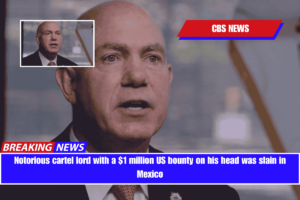Philadelphia’s largest port is a fast-paced operation where tens of millions of dollars in goods are transferred from ships arriving from the Delaware River to delivery trucks. Tariffs, however, may impede the smooth operation.
Holt Logistics’ president, Leo Holt, told CBS News that he follows tariff news “24 hours a day.”
“Including meetings and Zoom calls and every other kind of a call with the folks in other countries who supply the United States with many types of goods,” Holt pointed out.
Holt considers keeping the supply chain moving to be his family’s business. His company has been in operation for nearly a century, with four generations of owners.
While the nation’s ports may be relieved following President Trump’s 90-day moratorium on some reciprocal tariffs, uncertainty remains.
“We are the hub where ships are unloaded. Cargo is transferred. “It’s a critical component of the supply chain,” Holt explained.
According to the Bureau of Transportation Statistics, the East Coast received $637 billion in imports last year, with $216 billion arriving at Gulf ports and $548 billion arriving on the West Coast.
Holt Logistics employs approximately 500 people at the Port of Philadelphia, where longshoremen unpack and load products such as fruit from around the world destined for supermarkets throughout the United States. However, if Mr. Trump’s initial plan for reciprocal tariffs is implemented in full, cargo volume may decrease.
“If those ships are not present, or if their loads are light, the work hours will not be available. “It’s the cargo that creates the opportunities,” Holt explained.
Dan Ives, global head of technology research at Wedbush Securities, stated bluntly, “We’re looking at a financial armageddon.”
“You’d have to go back to the 1930 depression,” Ives said when asked if there was any precedent for what the United States could face. He cited “protectionist” policies and “some of the tariff acts” as factors that “really prolonged and caused the Great Depression.”
Holt Logistics survived the Great Depression by staying the course, not overreacting to the financial consequences of tariffs, and keeping the supply chain operational. Holt intends to do the same now, despite the possibility of tariffs in the future.
“People are ready to work and will innovate. They will work around and figure out what they need to do in a uniquely American way, regardless of the challenge,” he said.


















Leave a Reply